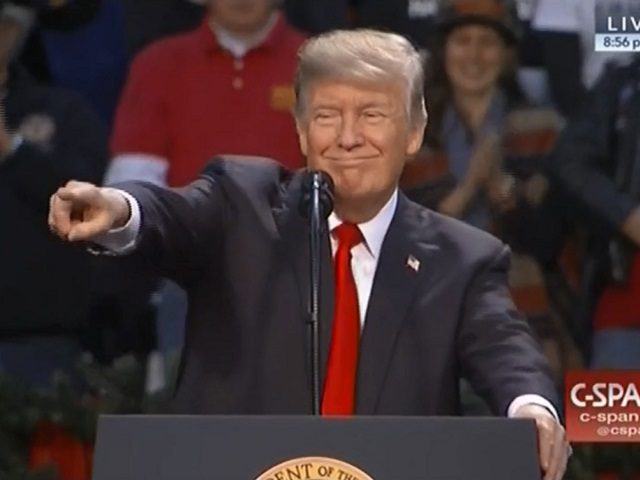Contrary to what coastal elites are saying, President Donald Trump’s bold decision to recognize Jerusalem as the capital of Israel and move the U.S. embassy there shows the incredible power of America’s Evangelical Christians, and how natural of an ally they are to Israel and America’s Jewish community.
Elite commentators miss the political reality here. One article read, “Trump Shift on Israel Highlights Lawyers’ Roles in Middle East Policy.” It credits the president’s son-in-law Jared Kushner, U.S. Ambassador to Israel David Friedman, and another lawyer of Jewish heritage as three of the leading influences that induced the president’s move.
There is no question that Kushner is a major force in the White House. There is also no question that Friedman is a force to be reckoned with, whom the Republican base believes is doing a spectacular job as America’s representative to the Jewish State. And the Jewish community is a significant political force.
But there are only about 5 to 9 million Jewish Americans (1.5 to 3 percent of the population). The wide variation on the number is because some Americans are Jewish by birth but are not followers of Judaism, and some surveys count persons for whom one parent is Jewish, while others require both parents.
Regardless of the actual number of Jewish Americans, it is dwarfed by the number of Evangelical Americans. Fully 24 percent of Americans self-identify as Evangelicals, though that number too is debatable, because only 15 percent actually hold to core Evangelical beliefs.
But coupled with the fact that Evangelicals register to vote at higher rates than the general adult population, either of these percentages translates to tens of millions of Americans, anywhere from 45 to 70 million voters.
In other words, Evangelicals are an extremely potent political force if mobilized to vote as a bloc. They voted overwhelmingly as a bloc for Donald Trump, with 81 percent pulling the lever for him in November 2016.
President Trump’s campaign promise to recognize Jerusalem as Israel’s eternal capital and to accordingly relocate the United States embassy to that city from its current location in Tel Aviv was wildly popular with Evangelicals, and one of the major reasons they voted for President Trump in record numbers.
Different types of Evangelicals look at Jerusalem differently. For dispensationalists, hundreds of Old Testament promises mentioning Israel refer for all time to the Jewish land on the Mediterranean between Egypt, Syria, and the Arabian Peninsula, beginning with God’s promise to Abraham in Genesis 12.
For groups like John Hagee’s Christians United for Israel (CUFI), prominent pastors like Dr. David Jeremiah, and institutions like Jerry Falwell’s Liberty University—all of which adhere to dispensational theology—these centuries of biblical promises regarding Jerusalem refer primarily or exclusively to the actual city first established as Israel’s capital by King David 3,000 years ago.
But for another type of Evangelicals—adherents of covenant theology—those promises and prophecies refer to the people of God throughout the centuries and throughout the world, of which “Israel” is but a metaphor.
Other Evangelicals are something of a hybrid, who believe in covenant theology on questions of salvation and a person’s relationship with God, but who nonetheless believe that the literal restoration of the nation-state of Israel as a Jewish state is a biblical promise of God, one which they passionately support.
Jerusalem is a tremendous treasure for Evangelicals of all stripes, as the location of the sacred temple and ultimately the place where Jesus Christ was crucified and resurrected. Its historical and religious value are priceless.
But for a subset of millions of Evangelicals, Jerusalem also holds centuries of divine promises, and Bible verses such as “Pray for the peace of Jerusalem” (Psalm 122:6) command all Christians to support Israel as a nation and the city of Jerusalem in particular.
These two communities—Jewish and Evangelical—form a very potent political constituency for President Trump regarding his decision on Jerusalem. The constituency is augmented by other denominations as well, such as millions of America’s 80 million Catholics who likewise believe there is some sort of profound religious significance to Jerusalem as the eternal capital of Israel.
President Trump’s promise and ultimate decision was driven by law in addition to politics. Within months of Republicans taking control of both legislative houses for the first time in half a century, Congress in 1995 passed the Jerusalem Embassy Act by a vote of 374-37 in the House and 93-5 in the Senate. Since that time three presidents—Clinton, Bush 43, and Obama—promised to implement its terms to move the U.S. embassy to Jerusalem, but never delivered. President Trump carried out a law that had sat dormant for two decades.
The president’s lawful action is expected to supercharge his Evangelical constituency with the tagline of “promise made, promise kept.” Along with the praise of the president pouring in from Israel, President Trump’s historic announcement may create an opportunity for him to forge a political alliance between his Evangelical base and part of the Democrat-leaning Jewish community, with unexplored potential for what such a coalition might mean.
Ken Klukowski is senior legal editor for Breitbart News. Follow him on Twitter @kenklukowski.

COMMENTS
Please let us know if you're having issues with commenting.